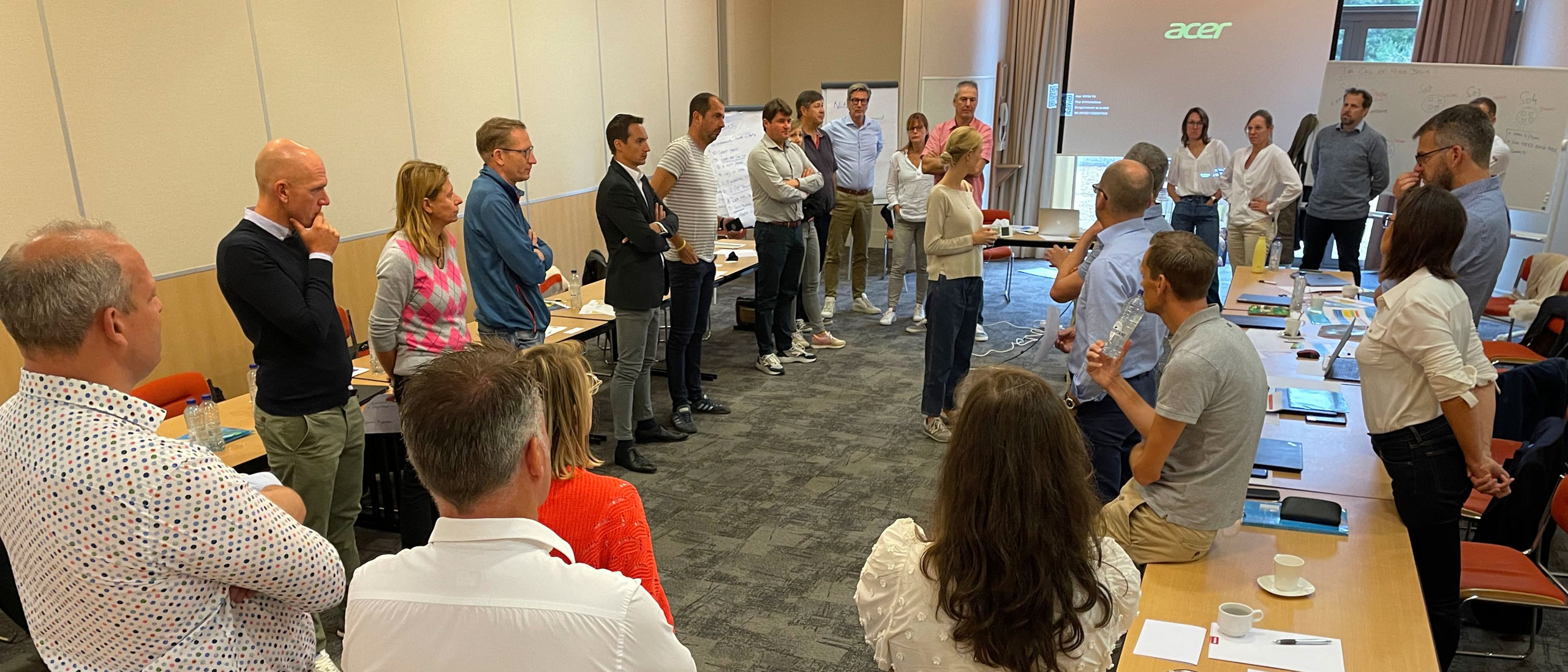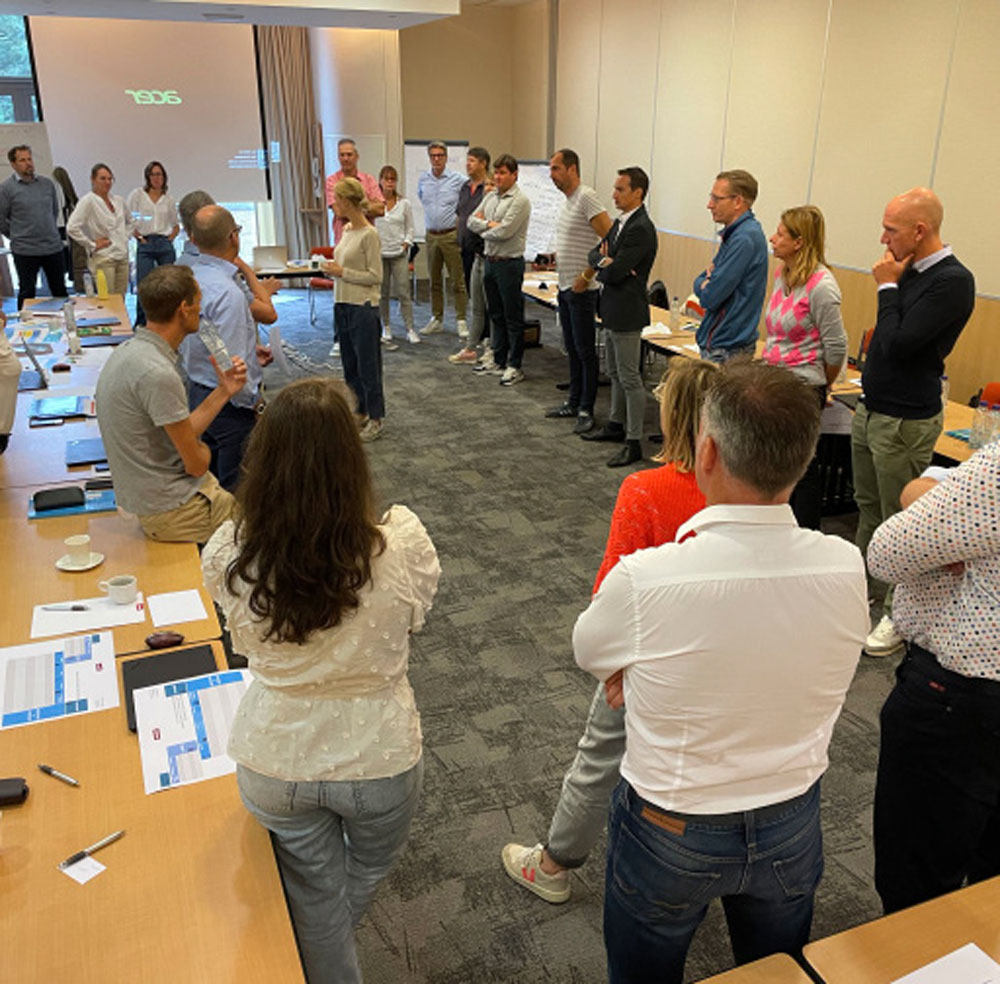Miele is transitioning into a new strategy and culture.
“A big thank you for navigating with us through uncharted waters. Your input, your persistence, your wide range of tools was truly inspiring.”
Martin Melzer – Senior VP Miele Region North West Europe
The challenge
There are many good reasons to choose Miele. Since its foundation in 1899 Miele lives and breathes “Immer Besser”: they do whatever it takes to continuously improve for their customers.
While some organizations are concerned about remote employees’ productivity in a bossless workspace, Miele is actively developing a culture where people drive ideas over hierarchy with a pioneering spirit.
These concepts are a fundamental part of the new strategy for 2030. It’s built on the belief that industrial-era approaches or digital-era assumptions aren’t up to the real-world challenges of its 21,000 employees.
“The real value of human capital is the ability to take ownership in complex situations.”
Raffaella Berardo – Managing director of Miele Belgium and Luxembourg.
The solution – summary
Key elements of the journey in Miele Belux :
- Create clarity on the new strategy and culture through storytelling
- Develop transformational leadership
- Tackle operational challenges that are no longer in line with the new strategy and culture
- Create openness and engagement across functional silos
After seeing some first small successes in the Belux region thanks to the will and skill of their management team and frontline pioneers, we zoomed out and included the North-West European leadership team.

The solution – elaborated
“The Digital Revolution will not reduce the role of people. We believe it’s the opposite. It’s the driver for putting people really at the center of value creation.” Nick Van Langendonck, Unbossers co-founder.
Bring new strategy & culture to life
We started in the midst of a new wave of COVID restrictions, so we created the most human-focused digital experience possible. There was a strong bonding experience in that. People opened up, self-reflected and connected in a trusting learning environment. That was a real gift because it made it possible to activate the new strategy & culture even in times of lockdown.
A new strategy and culture in a corporation like Miele always feels a bit complex in the beginning.
The people creating the strategic frameworks are far advanced in their thinking process, but for most of the other employees it’s brand new. At first people do not see the connection between the abstract concepts on the PowerPoint and their operational work.
That’s why we focused on storytelling. People created their personal interpretations of the strategy. Each team put the strategy in the unique words of each department and daily reality.
Develop transformational leadership
Research shows that 70% of an organizational culture is determined by leadership behavior. We helped leaders build awareness about their unique leadership style and gave hands-on advice on how to embody the desired culture even more and lead the change.
We also observed team meeting routines. Through experimentation we gradually found more effective and fun ways to collaborate.
Of all the skills of leadership, listening is the most valuable — and one of the least understood. That’s why we work a lot on people’s listen-talk ratios and leading by ‘not knowing’. Often, leaders think this is a sign of weakness. Certainly they feel exposed and very vulnerable. But, strangely enough, teams often perceive this as authenticity and a sign of strength, because the things you believe you have been able to hide from the teams are no secret to them.
Reinvent objective-setting process
Typically, a few managers tell hundreds of people what their objectives are and how to do their job. When the objective-setting process was about to start we very quickly realized that this was actually the key test moment of the new strategy & culture.
So we set two very basic principles — objectives need to have a clear link with the global strategy, and teams have to advise each other on the quality of the objectives — and then we flipped the pyramid.
This increased the clarity and engagement with the objectives. The collective intelligence of everyone was put forward and leaders defined a frame without filling in the how: “I want to work towards a common goal, so let’s figure out together what is the direction we must take. Here is the global strategy, so what should be our priorities locally?”
“We start to see accountability kick in. It does require a great deal of vulnerability, self-awareness, coaching and change,’’ Raffaella warns, “but a cultural shift is rising and that is rewarding to see.”
Set-up Grassroot movement
If you can create a high level of openness in an organization, people are encouraged to share their ideas, which they were holding back in the old days. If a leader can instigate this mindset, suddenly people start to build on each other’s ideas.
Suddenly, everybody feels that they’re there to contribute to the organization. As a result, people are more motivated and engagement goes up. But at the same time, they really feel that they matter. That they have an impact.
To set this kind of change in motion in daily operational challenges, we launched the ‘Grassroot movement’. In this initiative, we bring people together across functional departments and facilitate an informal yet ‘business matters’ dialogue.
We invite each participant to share their most pressing operational challenges. Others give advice and make the link with their respective challenges. By using the collective intelligence, people find pragmatic and creative solutions for everyday problems quickly. They feel seen by each other and find a sense of collective purpose. In parallel, they are bringing ‘the net works better’ to life, another crucial cultural element of Miele.
